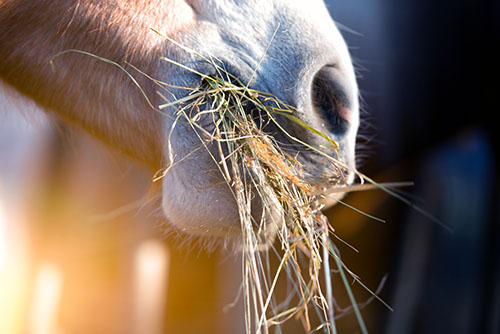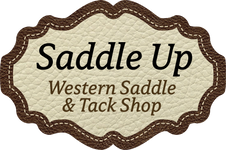Alfalfa vs. Grass Hay - Which is better for my horse?
Posted by Lynnsy Johnson - Saddle Up on Feb 27th 2020
The one thing every horse owner has in common is the desire to make our horses as happy as we possibly can. Or at least that is my goal in life. I want to do the very best for my horses and make sure they are healthy. Each horse is like each person. We are all individuals and we may have different needs. It can be difficult and overwhelming to pick the right hay, grain, or even supplement for your horse when there are so many options to choose from. A common discussion within the horse community is grass hay or alfalfa hay? Both options have pro's and con's. It all comes down to what is right for your particular horse. There are some factors to consider when choosing the right feed for your horse and we will chat about it today. Let's get started!
Horses are evolved grazing animals. They nibble on small amounts of food throughout the day. One of the most important things in a horse's diet is roughage. Hay equals roughage. It is important that they also get other key nutrients from their feed. When selecting a hay, you want to look into those specific amounts. Another thing to consider is how many different types of hay are out there and how that particular hay was stored, cut, and processed. Your location is also a big contributor in this. Certain regions can produce hay easier than others. In some places, the climate can make it difficult to grow hay and therefore they have a shortage. The biggest thing to think about is your horse's age, stage of life, activity level, breed, and overall health.
Alfalfa
Alfalfa is a very common choice for horse owners to feed. It contains more nutrients than grass hay including protein, calcium, and energy. For example, Alfalfa contains 21.2% protein and 11% simple starches. It is higher in calcium which can be good and bad. Obviously, horses need calcium, but too much can be unhealthy. Alfalfa has 3 times more calcium then grass hay. The Phosphorus (essential mineral for horses) ratio should be 2:1. The calcium may be higher in Alfalfa, but the Phosphorus is about the same as grass. This could lead to an imbalance in their diet.
With higher protein and energy amounts, Alfalfa is an ideal choice for a working ranch horse or performance horse. This is because they are worked regularly and they need more nutrients/energy to stay healthy with all their exercise. It is basically the same as someone who goes to the gym a lot. They eat a high protein diet to stay healthy and give them a nutrition boost. If you have an older horse who is retired and not worked regularly, Alfalfa may be too rich of a feed for them because they do not exercise as much as the performance horse. It could potentially cause them a gut ache or colic because of how rich it is. Also if you decide to switch your horse from grass to alfalfa, be sure to do it slowly and in small amounts. If a horse is not used to eating alfalfa, you can cause them to get sick or colic by completely switching them over in one day with a large amount of alfalfa. It can be really rich so they need to get used to it.
A common complaint about Alfalfa is that it makes your horse hot or very energized. Yes, this can happen, but usually as a result of feeding it improperly. Alfalfa hay is so packed with nutrients that you feed smaller portions to your horse. Sometimes people feed it in large amounts, like you would grass hay and with all the energy/nutrients, it will make your horse hot. If you feed a well balanced diet with Alfalfa, it should not make your horse hot. Another concern is the Calcium to Phosphorus ratio being correct. As I said earlier, if the ratio is off it can cause an imbalance. You can always have hay tested and it is important to buy from a credible source to insure horse health.
Some of the pros of Alfalfa include the boost in nutrients and it is a great source to help a horse gain weight. If you have a hard keeper or one that just needs some more fat, Alfalfa is more likely to get the job done than grass hay. Alfalfa is also lower in Carbohydrates which is great for horses with medical conditions such as metabolic syndrome, insulin resistance, or even laminitis. It is also said that once a horse is on Alfalfa, it reduces the risk of colic. Some horses may be allergic to grass hay so alfalfa is the better choice.
Grass
There are many different types of grass hay in the world. The two most common are Timothy and Orchard grass. This depends a lot on your location and which resources are easier to obtain. I think the biggest con about grass hay is its lack of nutrients. Earlier, I had talked about the percentage of protein in Alfalfa at 21.2%. Grass hay is only 10.85% protein and 12.9% simple starches. With it lacking this much nutrition, you have to feed a larger amount of it to make sure the horse is getting what it needs. With having to feed larger amounts, you typically go through grass hay faster than alfalfa and that reflects on the cost.
Another downfall to grass hay, is it is just a filler. It makes your horse feel full, but it doesn't really add weight to them. If you have a hard keeper, they may be able to gain weight easier and healthier on Alfalfa. One thing to watch out for is it can be more dangerous to feed grass to a horse that is overweight or prone to laminitis because of how much they consume. With the larger portion you have to feed, some horses may stand at their feeder all day and gorge themselves which can turn into a bigger problem. Something that can also be dangerous is grass has more Carbohydrates which can add to an overweight problem or different health problems.
Overall, grass lacks in nutrients, but it is a very common choice among horse owners. Some horses can be allergic to Alfalfa and so grass is the better option. Again think about your horses age and activity level. If you have a horse who doesn't get ridden that often and isn't competed on, grass may be the better option for them because they don't need the energy/nutrition boost.
If you are torn on the subject, you can always feed a grass/alfalfa mix. I personally go this route because I have performance horses who need the boost and a retired gelding who is a hard keeper. I also chose this option because I am highly allergic to straight alfalfa. My horses benefit from the Alfalfa but the mixture helps me be able to handle it better.
The most important thing to remember is what is best for your particular horse. It is also very crucial, no matter what you choose to feed, you feed it in a healthy portion. You can under feed as well as over feed a horse. Finding the right balance for your horse is key to their health.
If you have more questions or concerns about what to feed your horse, always consult your vet. You are also welcome to check out these other articles that I am attaching that go over the same subject. People can have different opinions, but it all comes down to what is the right decision for your horse. We hope this was helpful and hay, thanks for reading!
https://emsvet.com/feeding-grass-vs-alfalfa-hay/

(picture credit: https://lifedatalabs.com/blog/tag/best-hay-for-horses/?fbclid=IwAR0HIMTijrZy3CyNUAB0y-xyjdP4wxqsrrD2nut21p41NQO9QeyqjdudVDU)
